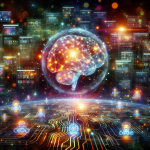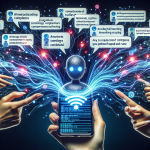Introduction: The Intersection of AI and Neuromarketing
In recent years, artificial intelligence (AI) has become a transformative force across many industries, and marketing is no exception. At the confluence of data science, neuroscience, and consumer behavior lies neuromarketing — a cutting-edge field that seeks to understand the subconscious processes driving consumer choices. When paired with the computational power of AI, neuromarketing becomes a powerful strategy for decoding what customers want before they even know it themselves.
What Is Neuromarketing?
Neuromarketing is the study of how the brain responds to marketing stimuli. By analyzing neural activity, eye movements, facial expressions, and physiological responses, marketers can gain insight into how consumers make decisions. Unlike traditional market research, which relies on surveys and focus groups, neuromarketing digs deeper — uncovering subconscious reactions that even the consumer may not be aware of.
Some of the techniques used in neuromarketing include:
- Electroencephalography (EEG) to monitor brainwave activity
- Functional Magnetic Resonance Imaging (fMRI) to track blood flow in the brain
- Biometric sensors to measure heart rate and skin conductivity
- Eye-tracking to follow visual attention
How AI Enhances Neuromarketing
AI brings scalability, speed, and precision to the world of neuromarketing. Here are a few ways AI strengthens the practice:
Data Analysis at Scale
Neuromarketing tools generate massive volumes of data — from terabytes of brain scans to thousands of biometric readings. AI algorithms, particularly machine learning models, can process this data at scale to identify patterns and correlations that might otherwise go unnoticed.
Predictive Modeling
AI can be trained to predict consumer reactions based on past neuromarketing data. For instance, a neural network might learn what kind of product packaging stimulates greater engagement or what type of emotional response corresponds to brand loyalty. This predictive capacity allows marketers to optimize their campaigns in real time.
Personalization
By combining biometric and behavioral data, AI can help companies deliver more personalized marketing experiences. Imagine an AI system that adapts website content based on a user’s subconscious engagement — modifying colors, layouts, or content tones to appeal to specific neural responses.
Understanding the Subconscious Consumer
The subconscious mind plays a crucial role in consumer behavior; it guides much of our decision-making without conscious awareness. AI-powered neuromarketing helps brands decode this invisible influence by:
- Identifying emotional triggers that influence purchase intentions
- Understanding the timing of neural responses to marketing materials
- Revealing how memory, attention, and perception shape brand affinity
For example, subtle design elements like font style or background music can influence the mood and engagement levels of a consumer seconds before they decide to click “Buy.” AI helps uncover these hidden cues so marketers can fine-tune their strategies.
Challenges and Ethical Considerations
As with any technology that delves into human cognition, ethical concerns are paramount. Using AI to decode subconscious preferences raises vital questions:
- How much data is too much?
- Are consumers truly giving informed consent?
- Could such influence veer into manipulation?
Transparency and regulation are critical as neuromarketing technologies evolve. Brands must strive to use these tools responsibly, ensuring that data is anonymized, consented, and used to enhance — not exploit — the consumer experience.
The Future: AI, Empathy, and Emotional Intelligence
Going forward, the synergy between AI and neuromarketing is likely to produce emotionally intelligent systems capable of adapting not just to consumer preferences but also to their current emotional states. This could manifest in dynamic ads that reshape themselves in real time or virtual assistants that respond to user stress levels with tailored solutions.
In a world where attention spans are shrinking and customer expectations are rising, AI-powered neuromarketing offers marketers a profound new way to connect — not just logically, but emotionally, with consumers.
Conclusion
AI and neuromarketing together represent a formidable toolset for decoding the mysteries of the consumer mind. By uncovering subconscious drivers of choice, marketers can craft more compelling, resonant, and ultimately ethical campaigns. As technology advances, the fusion of neuroscience and artificial intelligence promises a future where marketing is not just smarter—but more human.





